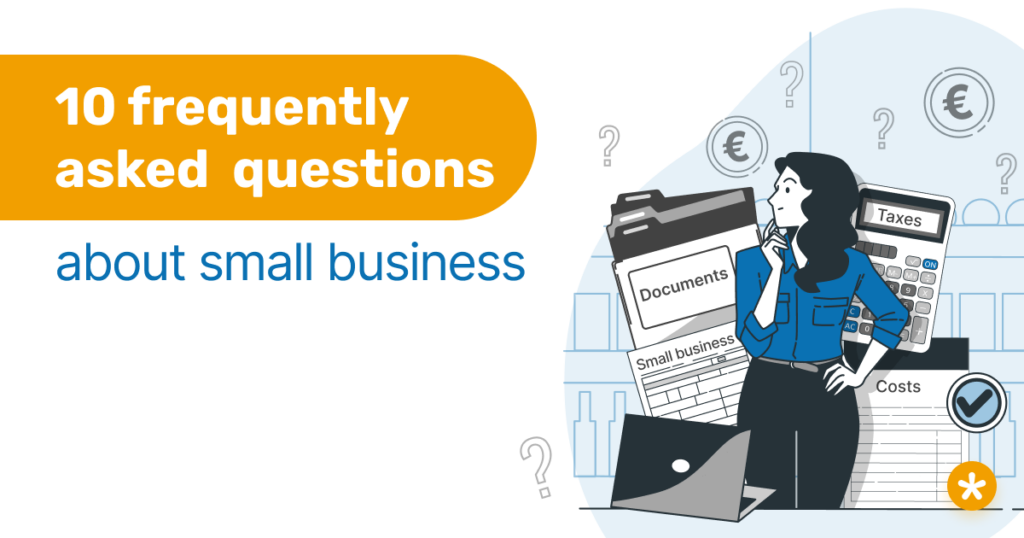
Do you have a good business idea and would like to start your own business or earn extra money on the side? Would you like to start small at first and try out your business activity with little regulatory effort? Then starting as a small business owner is a good and uncomplicated way to pursue your business idea!
We’ve compiled the 10 most frequently asked questions about small business to help you through the jungle of definitions and specifications.
A brief overview in advance
- Q1: When are you a small business owner?
- Q2: How do you register a small business?
- Q3: How much does a small business cost?
- Q4: How much am I allowed to earn as a small business owner?
- Q5: Does the small business regulation have disadvantages?
- Q6: Do I have a tax number as a small business owner?
- Q7: What taxes does a small business owner have to pay?
- Q8: What is the income tax rate for small business owners?
- Q9: What tax forms do I need to fill out as a small business owner?
- Q10: Does a small business owner have to write invoices?
Q1: When are you a small business owner?
They are considered small entrepreneurs if their sales from the previous calendar year did not exceed 22,000 euros and are expected to be below 50,000 euros in the current calendar year.
If these requirements are met, you can make use of the small business regulation. With this regulation, companies with low turnover can reduce their bureaucratic and administrative workload, as they do not have to report VAT and the monthly VAT return is not required.
Q2: How do you register a small business?
To register a small business, you need a trade license. This can be obtained either from the Trade Licensing Office or the Ordnungsamt (Public Order Office) in your municipality. After you have filled out your trade license, you can return it to the same office. Some cities now also offer online registration.
Q3: How much does a small business cost?
Starting a small business is relatively inexpensive, but there are processing fees for registration. The costs for registration are determined by the responsible municipality and usually vary between 20 and 65 euros.
Q4: How much am I allowed to earn as a small business owner?
In order to benefit from the small business regulation as a small business owner, you must not exceed the turnover limit of 22,000 euros. If your sales exceed this limit, you must switch to standard taxation at the beginning of the next fiscal year.
Q5: Does the small business regulation have disadvantages?
A disadvantage of the small business regulation is the waiver of the right to deduct input tax. This means that you cannot claim VAT paid, i.e. you cannot get it back from the tax office. Especially at the beginning of a business, there are often high investments to be made – thus also high VAT amounts that you cannot get back.
Q6: Do I have a tax number as a small business owner?
Yes, as soon as you have completed the business registration and are a small business owner, the tax office will automatically contact you and issue your tax number. If you are a small business owner in a freelance profession, you must approach the tax office yourself to apply for your tax number.
A VAT identification number (VAT ID) is generally not relevant for a small entrepreneur who only conducts business in Germany. However, for certain transactions in other EU countries, a VAT ID is also required for small entrepreneurs.
Small business owners who sell on an online marketplace, such as Amazon or eBay, will also need a VAT ID since July 2021. This serves to avoid tax losses caused by sellers who have not registered a business with the tax office. Since the tax office holds the platforms liable in this case, they check closely whether a seller is registered for tax purposes – the easiest way to do this is via the VAT ID. So, if you are a small business owner and you are active on an online marketplace, you should take care of the assignment of a VAT ID. This will not change your small business status.
Q7: What taxes does a small business owner have to pay?
There are no special taxes for small entrepreneurs, they are obliged to pay the same taxes as other self-employed companies.
However, no sales tax is levied on small business owners who take advantage of the small business regulation.
Trade tax is generally not levied either, since even small commercial entrepreneurs with an annual turnover of 22,000 euros are below the trade tax allowance of 24,500 euros.
Small business owners therefore usually only pay income tax.
Q8: What is the income tax rate for small business owners?
Income tax is levied on your total income. The assessment basis of income tax for self-employed persons is profit.
For small businesses, the surplus of operating income over operating expenses is considered profit. You can determine this in a simplified way with the help of the income statement.
It is impossible to generalize how much tax you will pay on your profit, as it depends on various factors:
- Total amount of taxable income
- Marital status
- Pension expenses and other special expenses
- Extraordinary expenses and donations
If your total income does not exceed the current basic tax-free amount, you can also be exempt from income tax as a small business owner. For 2022, the basic tax-free amount for single persons is 10,347 euros and for married couples 19,968 euros. So up to this tax-free amount, you do not have to pay any taxes as a small business owner.
If you know the sum of your total taxable income, you can use the official tax calculator to calculate your approximate tax burden.
Q9: What tax forms do I need to fill out as a small business owner?
As a small business owner, your tax obligations are limited. You can focus on the following tasks:
- Document collection of current income and expenses
- Regular monitoring of turnover (compliance with turnover limit)
- Annual sales tax return*
- Determination of profits (= income statement, “EÜR”)
- (private) income tax return
*Since you are a small business owner and have no sales tax income, you only need to confirm here that you have not collected any sales tax.
Q10: Does a small business owner have to write invoices?
Yes. If you make use of the small business regulation, you are obliged, like any other entrepreneur, to write an invoice for the supplies and/or services provided.
The invoice of a small entrepreneur is essentially no different from regular invoices. As a small business owner, you must also include the mandatory information on an invoice – the only thing you do not have to include is the VAT rate. You only need to add that your invoice does not show any sales tax, as you are exempt from this due to the small business regulation.
Just because you’re a small business owner doesn’t mean you can spend a lot of time on invoicing. On the contrary, time is often tight, especially as a small business owner.
That’s where easybill for small business comes in: with our cloud-based invoicing software, you can create legally compliant invoices, automate them, send them and much more with little effort. Leave the invoicing to easybill and focus on your business: Test the invoicing software here for 7 days free of charge.


